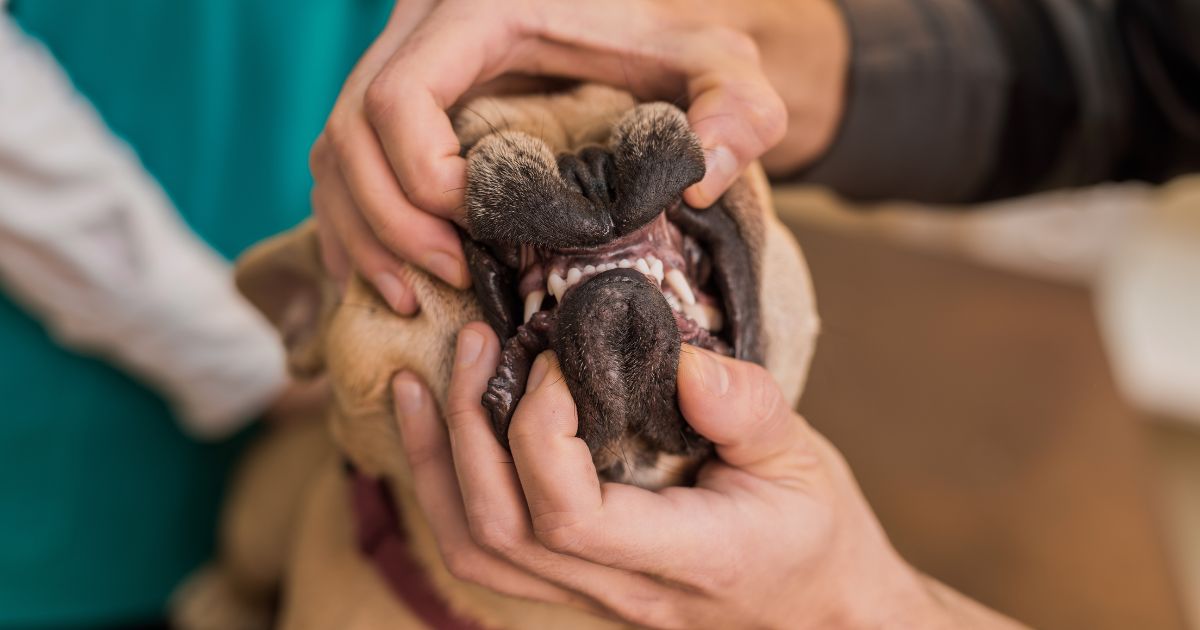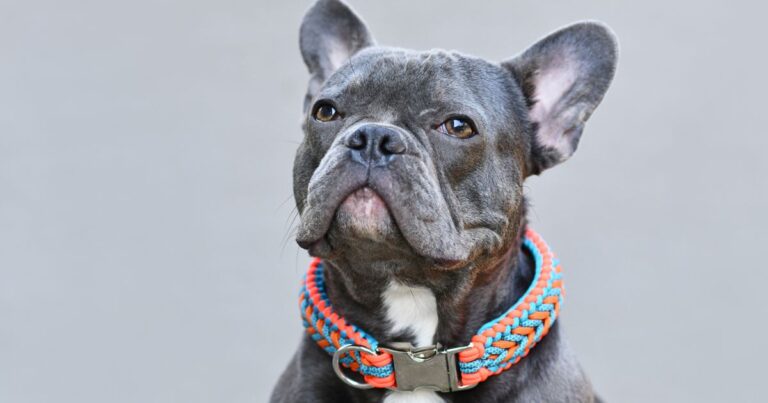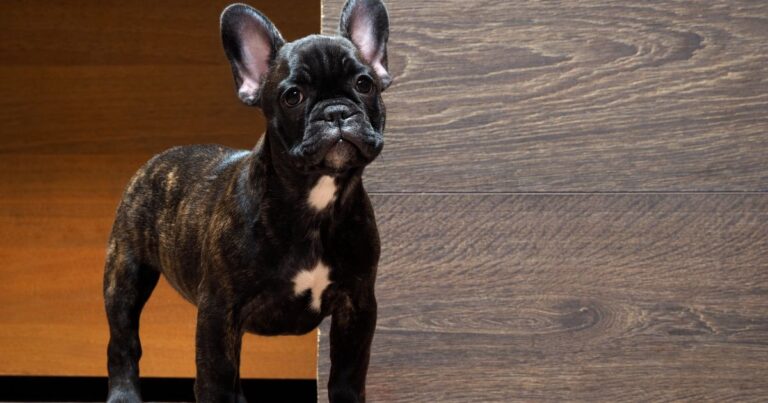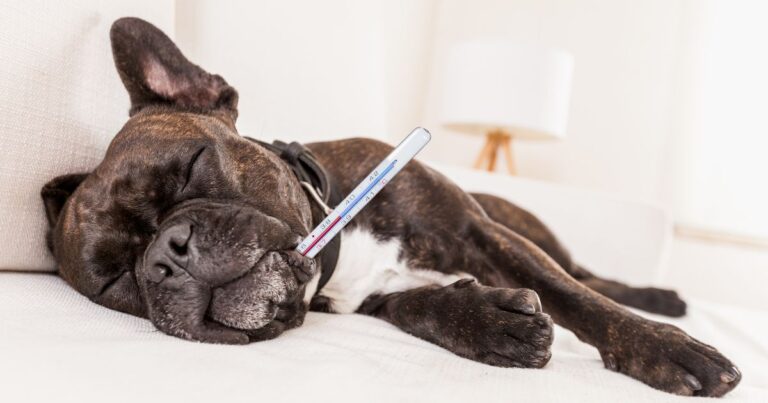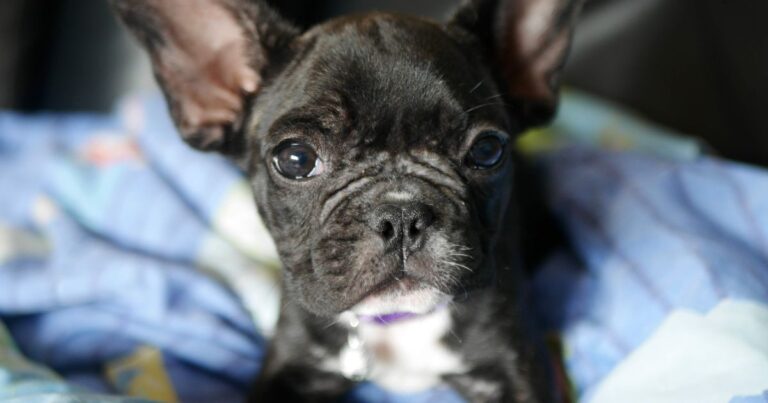French Bulldog Dental Health
Table of Contents
French Bulldog Dental Health
| Age (Months) | Dental Milestone |
|---|---|
| 0-2 | Toothless |
| 2-4 | Baby teeth emerge |
| 4-6 | Baby teeth fall out, adult teeth start to emerge |
| 6-8 | All adult teeth are in place |
Ever wondered why your Frenchie’s breath smells like he’s been snacking on old socks? Well, it’s all about “French Bulldog Dental Health”. Dive in to discover how to keep your Frenchie’s pearly whites sparkling and his breath fresh as a daisy!
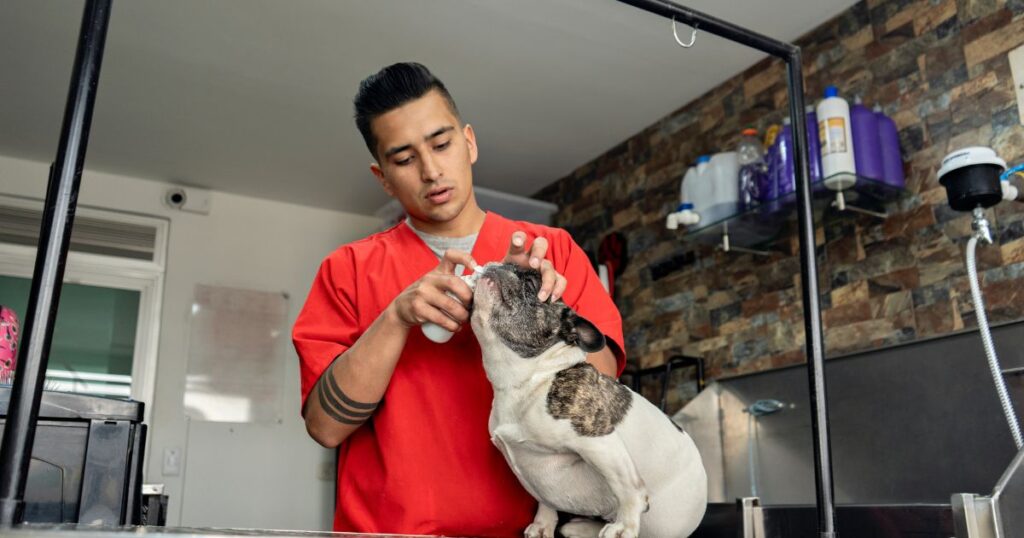
Introduction
Just like us humans, our adorable French Bulldogs, or ‘Frenchies’ as we lovingly call them, need proper dental care to keep their pearly whites shining and healthy. Dental health in French Bulldogs is often overlooked, but it plays a crucial role in their overall well-being. In this comprehensive guide, we’ll delve into the world of French Bulldog dental health, exploring everything from their unique teeth structure to common dental problems, and how to effectively care for your Frenchie’s teeth.
Prevention is the best medicine when it comes to dental health in French Bulldogs. Regular brushing, a good diet, and safe chew toys can go a long way in keeping your Frenchie’s teeth healthy.
Understanding the Importance of Dental Health in French Bulldogs
When we think about our Frenchie’s health, it’s easy to overlook their dental health, but it’s just as important as their diet and exercise. Dental health in French Bulldogs is not just about maintaining a bright smile. It’s about preventing oral diseases, ensuring proper nutrition, and contributing to their overall health and happiness. Poor dental health can lead to serious complications such as periodontal disease, tooth loss, and even systemic infections affecting the heart, liver, and kidneys.
Signs Your French Bulldog Needs Dental Care
- Bad breath
- Difficulty eating
- Excessive drooling
- Swollen or bleeding gums
- Loose or missing teeth
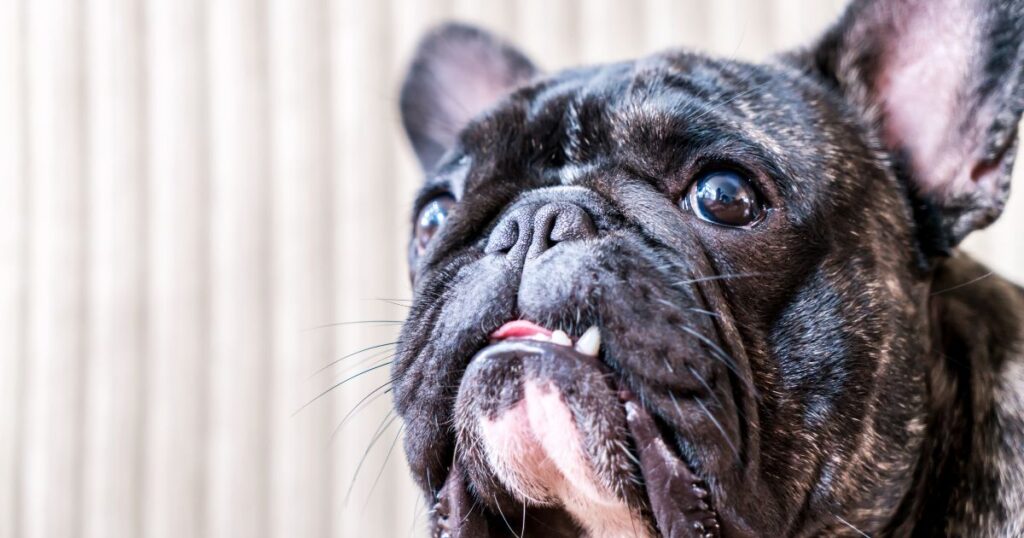
French Bulldog Teeth, what sets them apart?
French Bulldogs, like other breeds, have two sets of teeth in their lifetime – the deciduous (baby) teeth and the permanent (adult) teeth. However, what sets French Bulldogs apart is their brachycephalic nature. This term, meaning ‘short-headed’, refers to their distinct flat faces and short jaws, which can lead to crowded teeth. This crowding can make oral hygiene more challenging and increase the risk of dental problems.
French Bulldog Teeth Structure
Understanding the teeth structure of your Frenchie is the first step towards effective dental care. A Frenchie puppy is born toothless but soon develops 28 deciduous teeth, which are eventually replaced by 42 permanent teeth in adulthood. These include incisors for biting, canines for tearing, and premolars and molars for grinding food. Due to their short jaws, French Bulldogs often have crowded teeth, which can lead to dental problems if not properly cared for.
French Bulldog Teeth Overview
| Tooth Type | Number of Teeth | Function | Location in Mouth |
|---|---|---|---|
| Incisors | 12 | Used for grasping and tearing food | Positioned at the front of the mouth |
| Canines | 4 | Essential for holding and tearing food | Situated between the incisors and premolars |
| Premolars | 8 | Play a role in shearing, slicing, and crushing food | Located between the canines and molars |
| Molars | 4 | Responsible for grinding and crushing food | Found at the back of the mouth |
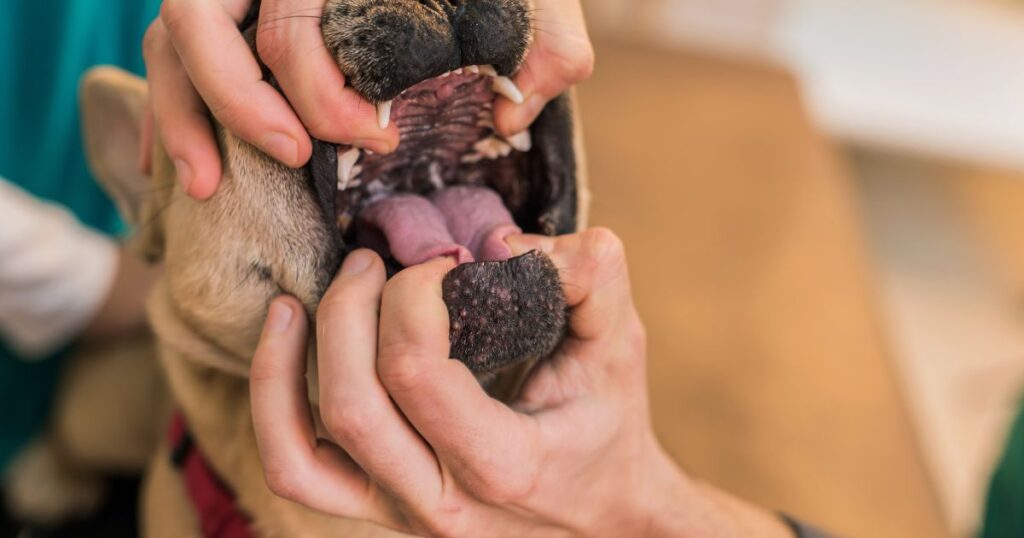
Common Dental Problems in French Bulldogs
French Bulldogs, with their unique breed characteristics, can face a few dental challenges that we, as responsible pet parents, should be aware of. Dental problems in French Bulldogs can range from mild issues like bad breath and plaque buildup to more serious conditions like periodontal disease and tooth loss.
Common Dental Problems in French Bulldogs
| Dental Problem | Symptoms | Prevention |
|---|---|---|
| Dental Crowding | Overlapping or twisted teeth | Regular check-ups with vet |
| Periodontal Disease | Bad breath, red or swollen gums, loose teeth | Regular brushing, professional cleanings |
Dental Crowding: A Unique Challenge
Dental crowding is a common issue in French Bulldogs due to their brachycephalic nature. When teeth are crowded, they can overlap, twist, and even get pushed forward. This not only affects your Frenchie’s bite but also makes it harder to clean their teeth effectively, leading to an increased risk of dental diseases.
Periodontal Disease: The Silent Threat
Periodontal disease is a serious dental condition that affects many French Bulldogs. It begins with the buildup of plaque, a sticky film of bacteria that hardens into tartar if not removed. This can lead to inflammation of the gums (gingivitis), and if left untreated, can progress to periodontitis, where the structures supporting the teeth get damaged, leading to tooth loss.
The Teething Process in French Bulldogs
If you’ve ever had a teething baby in the house, you’ll know it’s a tough time – and it’s no different for our Frenchie puppies. Teething is a natural process where puppies lose their baby teeth to make way for adult teeth. This process can be uncomfortable for your Frenchie, leading to symptoms like excessive chewing, drooling, and sometimes, loss of appetite.
Teething is a significant milestone in your Frenchie puppy’s life. This process usually begins around 3-4 weeks of age when the baby teeth start to emerge, and continues until about 6-7 months of age when the adult teeth are fully developed. During this time, your Frenchie puppy may experience discomfort, leading to symptoms like excessive chewing and drooling.
Teething Timeline: From Gummy Smile to Perfect Grin
The teething timeline in French Bulldogs is similar to other breeds. The baby teeth start to emerge around 3-4 weeks of age, and by 8 weeks, all 28 baby teeth are usually present. Between 3-7 months of age, these baby teeth are replaced by 42 adult teeth. During this time, it’s important to provide safe chew toys to soothe your puppy’s gums and promote healthy dental development.
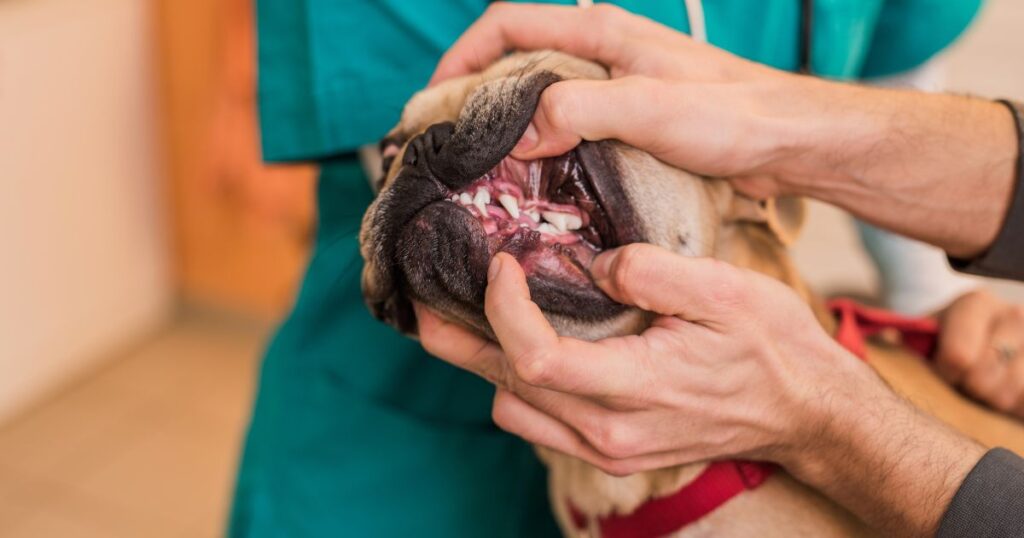
Caring for Your Frenchie’s Teeth: Daily Maintenance and Upkeep
Just like we brush our teeth daily, our Frenchies also need regular dental care to prevent issues and keep their chompers in top shape. Regular brushing with a dog-safe toothpaste, dental chews, and professional cleanings are all part of a comprehensive dental care routine. Remember, early prevention is key to avoiding serious dental problems down the line.
Dental Care Routine for French Bulldogs
| Daily Care | Description |
|---|---|
| Brushing | Use a dog-safe toothpaste and brush |
| Dental Chews | Provide dental chews that help clean teeth |
| Professional Cleaning | Schedule regular professional cleanings with your vet |
The Role of Diet in Dental Health
What our Frenchies eat plays a significant role in their dental health, and as their caretakers, we need to ensure they’re getting the right nutrition. A balanced diet not only provides the necessary nutrients for overall health but can also contribute to good dental health. For instance, dry kibble can help reduce plaque buildup, while certain foods can promote healthier gums and stronger teeth.
Chewing and Dental Health: The Importance of Safe Toys
Chewing is a natural instinct for our Frenchies, and the right toys can not only keep them entertained but also contribute to their dental health. Chew toys can help clean your Frenchie’s teeth, massage their gums, and even freshen their breath. However, it’s important to choose safe, non-toxic chew toys that are appropriate for your Frenchie’s size and chewing style.
Choosing Safe Chew Toys for French Bulldogs
| Chew Toy | Benefits |
|---|---|
| Rubber Toys | Durable and helps clean teeth |
| Rope Toys | Helps floss teeth |
| Dental Chew Toys | Designed to clean teeth and freshen breath |
Our Frenchies rely on us for their dental health. It’s our responsibility to ensure they have a healthy mouth, which contributes to their overall health and happiness.

Conclusion
Caring for our French Bulldog’s dental health might seem like a daunting task, but with the right knowledge and tools, it can become a simple part of our daily routine. Remember, a healthy mouth contributes to a healthy Frenchie, so let’s make dental care a priority for our furry friends.
For more information on French Bulldog health and care, check out these articles on French Bulldog Health and Care and French Bulldog health issues.
Also check out related posts: French Bulldog Obesity and Weight Management and French Bulldog Heat Intolerance.
Disclaimer: This article is intended for informational purposes only. It’s not a substitute for professional veterinary advice, diagnosis, or treatment. Always seek the advice of your veterinarian or other qualified health provider with any questions you may have regarding your pet’s health.
Frequently Asked Questions
Do French Bulldogs have dental problems?
Yes, French Bulldogs can have dental problems. Due to their unique jaw and teeth structure, they are prone to issues like dental crowding and periodontal disease. Regular dental care and check-ups can help prevent these problems.
Should French Bulldogs get their teeth cleaned?
Absolutely! Regular teeth cleaning is essential for maintaining your French Bulldog’s dental health. This includes daily brushing at home and professional cleanings by a vet as recommended.
How do I keep my French Bulldog’s teeth clean?
Keeping your French Bulldog’s teeth clean involves regular brushing with a dog-safe toothpaste, providing dental chews, and scheduling professional cleanings with your vet.
How often do French Bulldogs need their teeth cleaned?
Ideally, you should brush your French Bulldog’s teeth daily. Professional cleanings should be scheduled as recommended by your vet, typically once or twice a year.
What are healthy gums for French Bulldogs?
Healthy gums in French Bulldogs should be firm and pink. Red, swollen, or bleeding gums can be a sign of dental problems and should be checked by a vet.
Can dogs go without teeth cleaning?
While some dogs may not show immediate signs of dental problems, going without teeth cleaning can lead to serious oral diseases over time. Regular teeth cleaning is essential for all dogs, including French Bulldogs.
Does my dog really need a dental cleaning?
Yes, dental cleanings are an important part of your dog’s overall health care. They help prevent dental diseases and can contribute to your dog’s longevity and quality of life.
Should I clean my dog’s teeth every day?
If possible, yes. Daily brushing can significantly reduce the risk of dental diseases. However, if daily brushing is not feasible, aim for at least three times a week.
How can I improve my dog’s dental hygiene?
Improving your dog’s dental hygiene involves regular brushing, providing dental chews, feeding a balanced diet, and scheduling regular professional cleanings with your vet.
Does coconut oil keep dogs’ teeth clean?
Coconut oil has antimicrobial properties and can help keep your dog’s teeth clean when used as a supplement to regular brushing. However, it should not replace regular dental care routines.
How can I keep my dog’s teeth healthy naturally?
Natural ways to keep your dog’s teeth healthy include regular brushing, providing dental chews, feeding a balanced diet, and offering safe chew toys. Regular check-ups with your vet are also crucial.
